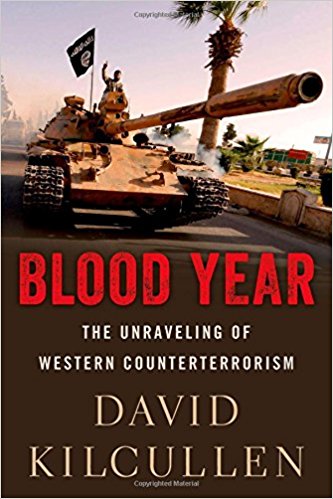Blood Year, written by David Kilcullen, captures the events leading up to and following the 2014 crisis in the Middle East. The book analyses key occurrences surrounding the emergence of ISIS and how the West made several strategic errors enabling the spread of the self-proclaimed caliphate. Blood Year also investigates the importance of Russian involvement in the Middle East, the Iranian nuclear deal and the European Refugee crisis, all of which contributed to the amorphous war that the West now finds itself in.
Since rising to prominence with his first book The Accidental Guerrilla, Kilcullen has been appointed as a senior adviser to General Petraeus assisting in the design of the ‘Surge’ in 2007. Subsequently, Kilcullen was appointed special advisor for counterinsurgency to the then-US Secretary of State Condoleezza Rice.
Blood Year is not a comprehensive history of the Middle East. Rather, it is a detailed analysis of key events over the past decade that led the West from fighting a War on Terror to combating a trans-national terror group come pseudo-nation state. Kilcullen is equally critical of both the Bush and Obama administrations, despite their seemingly polarised rhetoric. Blood Year does not go so far as to attribute responsibility for the current situation now faced by Western powers to a specific administration, but instead identifies a number of flawed decisions and missed opportunities over the past 10 years.
Kilcullen’s personal involvement in the development and implementation of various strategies have given him a unique and broad understanding of how policies of various states have shaped the region as we know it today. Kilcullen’s extensive knowledge in the Middle East allows him to articulate this complex narrative in clear, concise terms (for both the experienced and inexperienced). Blood Year guides the reader through the operational and strategic level of the War on Terror, using familiar events in recent history that provides context and clarity to Kilcullen’s analysis.
Despite Kilcullen’s ability to explain ISIS’ recent rise in prominence, Blood Year leaves the reader on a cliff’s edge as it skirts around any plausible options for the path ahead. As described by Nicholas Stuart’s 2016 review of the book for the Sydney Morning Herald[1] Kilcullen resists the temptation to offer simplistic solutions and remains somewhat implicit. Whilst this book provides an excellent explanation to how ISIS rose in prominence, it does not spell out a strategy for the future.
Blood Year deals with multifaceted and complex issues in a manner which is both easy to follow and comprehend. Kilcullen’s knowledge in this area provides the reader with analysis that a journalist would find hard to match, making Blood Year a useful guide for anyone wishing to further understand the current situation in the Middle East and the broader War against Terror. With a seeming revival of a Russian-American proxy competition in Syria, an enhanced understanding of ISIS and the War on Terror will only become more relevant in the future.
About the author
Captain Nicholas Waugh is a Forward Observer in the 4th Regiment, Royal Australian Artillery. He holds a Bachelor in Politics and a Masters in Strategy and Security from the University of New South Wales.
Endnote:
[1] http://www.smh.com.au/entertainment/books/book-review-blood-year-by-david-kilcullen-20160225-gn3lp2.html

